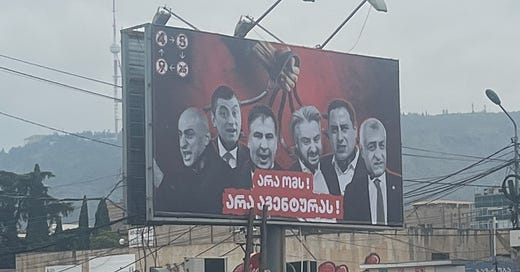'The More Police Brutality We See, The Angrier We Get': Georgian Protests Gather Momentum
The specter of Belarus lingers over the country of the country which like Ukraine, borders Russia and the Black Sea
A warm welcome to all new subscribers. I love writing this newsletter but it does take a lot of work. If you enjoy it and can afford it, please do consider taking out a paid subscription. And please do share this free post with anyone you think might be interested and encourage them to subscribe too. As always, I value your comments and feedback! I’m running a deal for a yearly subscription this week only.
Protests have been growing in Georgia for five consecutive nights following the government's announcement on November 28 to suspend EU accession talks through 2028. The announcement followed the ruling party, Georgian Dream (GD), declaring victory in the October 26 parliamentary elections, which neither the EU nor the U.S. have recognized as free and fair; independent observers have documented widespread fraud and violence. Many protesters view the announcement and disputed election as clear evidence that Georgia, which declared independence from the Soviet Union in 1991, is irretrievably becoming an authoritarian Russian vassal state like Belarus, which had its own stolen election in 2020.
Shortly before the election, I traveled to the Georgian capital of Tbilisi as part of a reporting trip organized by the Berlin journalism organization n-ost. Civil society activists described the multifaceted government pressure campaign to turn out the vote for the incumbent right-wing populist party. GD employed tactics such as pressuring state employees and families with relatives in prison. Following GD declaring victory with 54 percent of the vote, the opposition seemed to be caught flat-footed and only started protesting the result a full two days later. These protests largely died out, and the EU and U.S. statements following the elections -- while not recognizing the result -- did not result in visa bans or sanctions. When I spoke at a panel at n-ost alongside two Georgians on November 13 about the election aftermath, the mood was decidedly downbeat: GD seemed to have gotten away with stealing an election.
The momentum shifted on November 28, when Prime Minister Irakli Kobakhidze announced that he was suspending EU accession talks through 2028, saying it was "categorically unacceptable for us to view integration into the EU as a favor." The decision recalled the spark that led to the Euromaidan protests of 2013-14 in Ukraine; Russian and Georgian state propaganda have drawn a negative comparison between these protests. The accession process, begun under GD in December 2023, had stalled due to EU concerns over the government's adoption of laws -- resembling similar ones in Russia and Hungary -- targeting civil society and LGBTQ people. While GD has maintained a conciliatory attitude towards Moscow -- its honorary chairman, billionaire Bidzina Ivanishvili, made his fortune in 1990s Russia -- it also posted large pre-election billboards with the EU flag touting accession to the 27-member bloc "with dignity." Opinion polls show some 80 percent of Georgians favor EU accession.
The protests have only grown since the announcement, and have spread to many cities outside the capital. Georgia's president, Salome Zourabichvili, who was the last president elected by popular vote in 2018, has said that she will not step down when her six-year term ends on December 29, because she views the October 26 elections as an illegitimate "Russian special operation." She has called for new elections. (2017 constitutional changes shifted presidential elections to an electoral college dominated by members of parliament and the ruling party. Her powers are mostly ceremonial as president; however, she is the de facto leader of the opposition.)
I asked a panelist from last month's discussion, Luka Bluashvili of the independent television channel Formula, for his view on the protests. He wrote in an email that "the situation has changed completely." He added, "The recent decision to abort EU accession caused anger. Everything we see happening in Tbilisi is not managed by the political parties but the people themselves. Taking advantage of this, the President and opposition parties are now doubling down to keep the matter of rigged elections on the political agenda." He continued, "Everyone starts to realise that protests will not fade away; they're only growing. It is difficult to say if GD has calculated everything well, but the fact is that the country has NEVER seen a protest of this scale."
Authorities have responded to the protests with brutality, deploying tear gas and water cannons, while men with balaclavas were seen running into the crowds and beating protesters. The government has said it has detained over 200 people; Transparency International Georgia said that many were severely beaten in custody.
Prime Minister Kobakhidze has tried to backpedal his decision, saying on December 1 that "we have not suspended anything, it's a lie." However, several top diplomats have resigned because of the announcement and hundreds of civil servants and thousands of teachers have signed letters condemning the move.
Yet, Prime Minister Kobakhidze and President Zourabichvili remain at loggerheads; on December 1, he said he understands her "emotional state," but she would have to vacate the presidential residence by December 29 to make room for GD's nominee, former Manchester City footballer Mikheil Kavelashvili, an outspoken critic of the West. The Georgian government also believes that the incoming Trump Administration, which has its own authoritarian leanings, will lead to a "complete reset" in relations. Bluashvili wrote to me that the situation was hard to predict: "Will GD ultimately lose power, step down or call for new elections (and ensure they are fair)? I can't really say. It is still too early to make any predictions. But the fact is that people will protect the President's institution and will also continue protesting. The more police brutality we see, the angrier we get."
Correction: An earlier version of this post misstated how President Zourabichvili was elected; she won the popular vote in 2018.




